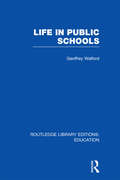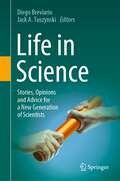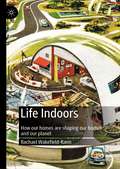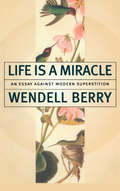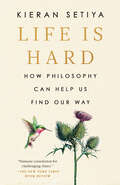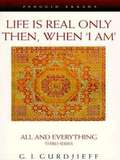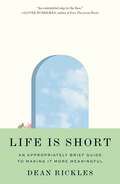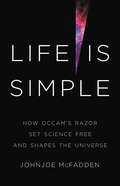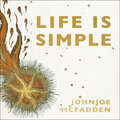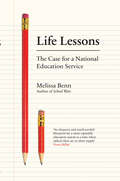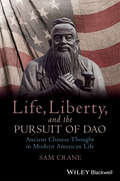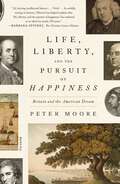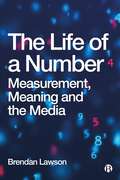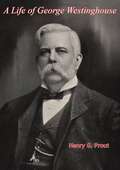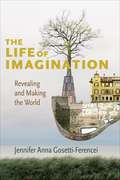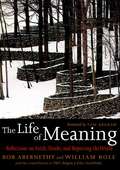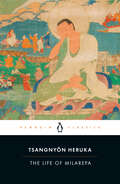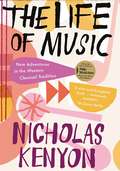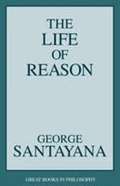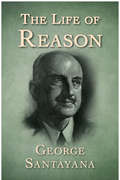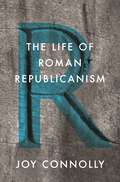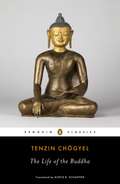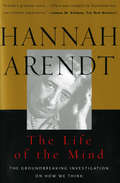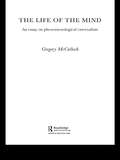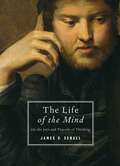- Table View
- List View
Life in Public Schools (Routledge Library Editions: Education)
by Geoffrey WalfordBritain’s public (that is, its major independent) schools have a conspicuous role in the country’s social system, and as a result are the subject of a long-standing political debate. The discussion is generally founded on a stereotyped image of what these school may have been like in the 1950s – this books shows how they were in the late 1980s. It is based on fieldwork in two major public boarding schools which the author conducted over an extended period, and draws on interviews, observation and documentary sources to establish a picture of what public school life is actually like for pupils and staff. Since the schools were predominantly male preserves, the major part of the book describes the social world and experiences of boys and school-masters. An important section of the book, however, discusses the introduction of girl pupils, the experiences of female teachers and the way schoolmasters’ wives tend to be drawn into their husbands’ work. Geoffrey Walford’s conclusions about life in public schools differ considerably from traditional expectations. At the same time he asks whether there really has been a ‘public school revolution’. His book makes an important contribution to our knowledge of public schools, to debates in the sociology of education and to the issues of abolishing or extending the independent sector.
Life in Science: Stories, Opinions and Advice for a New Generation of Scientists
by Diego Breviario Jack A. TuszynskiThis book is a collection of stories, reflections and advice written by proficient scientists. They address the question of what doing science means to them, and describe attitudes and working practices that have proved effective and rewarding. The book is aimed in particular at young people who are attracted by science or already undertaking undergraduate studies, and who are considering making science their long-term profession. It will also be helpful and revealing to early-career scientists who are searching for their own best route to success. The book serves as a platform for experienced scientists to describe their original inclination, how that subjective disposition found its expression in their way of doing science, whether their expectations were met, and what achievements they can claim. But it is not restricted to success: contributors also share details of the limitations and failures they have encountered. Last but not least they describe how they see science now, how they think it will be in the near future, and what advice they would give to the their much younger colleagues. Readers will appreciate the diversity of the individual paths shaped by different education, motivation, ambition, inclination, intuition, feeling, belief and eligibility. At the same time the stories confirm that science relies on a translation of this subjective level into an objective level, one that is shared and accepted by the international scientific community, and whose results are produced with a commonly accepted and fully rational scientific method of investigation.
Life Indoors: How our homes are shaping our bodies and our planet
by Rachael Wakefield-RannIn this timely and expansive book, Wakefield-Rann investigates how emerging disease ecologies are undermining definitions of health and immunity that have persisted since the 19th century, and had a formative influence over the design of not only homes, but entire cities. This wide-ranging account traces the links between the history of medicine, modernist design and architecture, the rise of inflammatory disease, the microbiomes of buildings and humans, antimicrobial resistance, and novel chemical pollutants, to show how indoor environments have made us as we have made them. In highlighting the processes that have been missed in designing perfectly controlled interior habitats, Life Indoors shows the limitations of dominant practices, classifications and philosophies to apprehend current indoor pathogen ecologies.
Life Is a Miracle: An Essay Against Modern Superstition
by Wendell Berry[A] scathing assessment . . . Berry shows that Wilson's much-celebrated, controversial pleas in Consilience to unify all branches of knowledge is nothing more than a fatuous subordination of religion, art, and everything else that is good to science . . . Berry is one of the most perceptive critics of American society writing today. The Washington Post€œI am tempted to say he understands [Consilience] better than Wilson himself . . . A new emancipation proclamation in which he speaks again and again about how to defy the tyranny of scientific materialism.The Christian Science MonitorIn Life Is a Miracle, the devotion of science to the quantitative and reductionist world is measured against the mysterious, qualitative suggestions of religion and art. Berry sees life as the collision of these separate forces, but without all three in the mix we are left at sea in the world.
Life Is Hard: How Philosophy Can Help Us Find Our Way
by Kieran SetiyaA philosophical guide to facing life&’s inevitable hardships. There is no cure for the human condition: life is hard. But Kieran Setiya believes philosophy can help. He offers us a map for navigating rough terrain, from personal trauma to the injustice and absurdity of the world. In this profound and personal book, Setiya shows how the tools of philosophy can help us find our way. Drawing on ancient and modern philosophy as well as fiction, history, memoir, film, comedy, social science, and stories from Setiya&’s own experience, Life Is Hard is a book for this moment—a work of solace and compassion.Warm, accessible, and good-humored, this book is about making the best of a bad lot. It offers guidance for coping with pain and making new friends, for grieving the lost and failing with grace, for confronting injustice and searching for meaning in life. Countering pop psychologists and online influencers who admonish us to &“find our bliss&” and &“live our best lives,&” Setiya acknowledges that the best is often out of reach. Instead, he asks how we can weather life&’s adversities, finding hope and living well when life is hard.
Life Is Real Only Then, When I Am: All and Everything Third Series
by G. I. GurdjieffBegun in 1934, this final volume of Gurdjieff's trilogy, All and Everything, is a primary source for Gurdjieff's ideas, methods, and biography. Gurdjieff offers guidance to his "community of seekers," through a selection of talks given in 1930, autobiographical material crucial to understanding his ideas, and the incomplete essay "The Outer and Inner World of Man. " Available for the first time in paperback, this is the ultimate piece of Gurdjieff's work that his numerous followers have been waiting for. .
Life Is Short: An Appropriately Brief Guide to Making It More Meaningful
by Dean RicklesWhy life’s shortness—more than anything else—is what makes it meaningfulDeath might seem to render pointless all our attempts to create a meaningful life. Doesn’t meaning require transcending death through an afterlife or in some other way? On the contrary, Dean Rickles argues, life without death would be like playing tennis without a net. Only constraints—and death is the ultimate constraint—make our actions meaningful. In Life Is Short, Rickles explains why the finiteness and shortness of life is the essence of its meaning—and how this insight is the key to making the most of the time we do have.Life Is Short explores how death limits our options and forces us to make choices that forge a life and give the world meaning. But people often live in a state of indecision, in a misguided attempt to keep their options open. This provisional way of living—always looking elsewhere, to the future, to other people, to other ways of being, and never committing to what one has or, alternatively, putting in the time and energy to achieve what one wants—is a big mistake, and Life Is Short tells readers how to avoid this trap.By reminding us how extraordinary it is that we have any time to live at all, Life Is Short challenges us to rethink what gives life meaning and how to make the most of it.
Life Is Simple: How Occam's Razor Set Science Free and Shapes the Universe
by Johnjoe McFadden"In short, Life Is Simple is enthralling."--Michael Blastland, ProspectA biologist argues that simplicity is the guiding principle of the universe Centuries ago, the principle of Ockham&’s razor changed our world by showing simpler answers to be preferable and more often true. In Life Is Simple, scientist Johnjoe McFadden traces centuries of discoveries, taking us from a geocentric cosmos to quantum mechanics and DNA, arguing that simplicity has revealed profound answers to the greatest mysteries. This is no coincidence. From the laws that keep a ball in motion to those that govern evolution, simplicity, he claims, has shaped the universe itself. And in McFadden&’s view, life could only have emerged by embracing maximal simplicity, making the fundamental law of the universe a cosmic form of natural selection that favors survival of the simplest. Recasting both the history of science and our universe&’s origins, McFadden transforms our understanding of ourselves and our world.
Life is Simple: How Occam's Razor Set Science Free And Unlocked the Universe
by JohnJoe McFaddenLife is Simple tells the remarkable story of how a thirteenth century monk's search for simplicity led to the emergence of the modern world.We begin in the turbulent times of the medieval friar, William of Occam, who first articulated the principle that the best answer to any problem is the simplest. This theory, known as Occam's razor, cut through the thickets of medieval metaphysics to clear a path for modern science. We follow the razor in the hands of the giants of science, from Copernicus, to Kepler, Galileo, Newton, Darwin, Einstein, Rubin and Higgs. Its success suggests that we live in the simplest possible habitable universe and supports the revolutionary theory that our cosmos has evolved.By highlighting the very human passion, curiosity, mistakes and struggles of those who were inspired by Occam's razor to create the modern world, Johnjoe McFadden provides new insight into what science is really about. And that the principle of simplicity is as relevant today as ever.(P) 2021 Hodder & Stoughton Limited
Life Lessons: The Case for a National Education Service
by Melissa BennA radical agenda to make our education system fit for the twenty-first centuryOur education system has been damaged by politicians who have arrogantly imposed a regime of market-driven reforms. It is time to reframe education as an essential public good, one arising from a hunger to find more engaging ways to learn and the powerful imperative to make our society genuinely equal.In this timely and provocative essay, Melissa Benn argues for a National Education Service. Like the NHS, the NES would provide the framework for a life-long entitlement to education: from early-years provision to apprenticeships, universities and adult education. It should be free at the point of delivery. It should nurture teachers and scholarship, moving beyond an obsession with exam results to create fully rounded, questioning citizens. Its eventual aim should be an integrated, comprehensive system available to all.
Life, Liberty, and the Pursuit of Dao
by Sam CraneThis highly original work introduces the ideas and arguments of the ancient Chinese philosophies of Confucianism and Daoism to some of the most intractable social issues of modern American life, including abortion, gay marriage, and assisted suicide.Introduces the precepts of ancient Chinese philosophers to issues they could not have anticipatedRelates Daoist and Confucian ideas to problems across the arc of modern human life, from birth to deathProvides general readers with a fascinating introduction to Chinese philosophy, and its continued relevanceOffers a fresh perspective on highly controversial American debates, including abortion, stem cell research, and assisted suicide
Life, Liberty, and the Pursuit of Happiness: Britain and the American Dream
by Peter Moore“Gripping . . . Vibrant . . . A wonderfully absorbing and stimulating book.” —Sarah Bakewell, NBCC Award–winning author of How to Live and Humanly Possible“[A] rollicking account . . . The book’s compulsive readability is a tribute to Moore’s skill at cracking open the pre-revolutionary period.” —Charles Arrowsmith, The Washington PostA spirited group biography that explores the origins of the most iconic words in American history, and the remarkable transatlantic context from which they emerged.The most famous phrase in American history once looked quite different. “The preservation of life, & liberty, & the pursuit of happiness” was how Thomas Jefferson put it in the first draft of the Declaration, before the first ampersand was scratched out, along with “the preservation of.” In a statement as pithy—and contested—as this, a small deletion matters. And indeed, that final, iconizing revision was the last in a long chain of revisions stretching across the Atlantic and back. The precise contours of these three rights have never been pinned down—and yet in making these words into rights, Jefferson reified the hopes (and debates) not only of a group of rebel-statesmen but also of an earlier generation of British thinkers who could barely imagine a country like the United States of America.Peter Moore’s Life, Liberty, and the Pursuit of Happiness tells the true story of what may be the most successful import in US history: the “American dream.” Centered on the friendship between Benjamin Franklin and the British publisher William Strahan, and featuring figures including the cultural giant Samuel Johnson, the ground-breaking historian Catharine Macaulay, the firebrand politician John Wilkes, and revolutionary activist Thomas Paine, this book looks at the generation that preceded the Declaration in 1776. Everyone, it seemed, had “life, liberty, and the pursuit of happiness” on their minds; Moore shows why, and reveals how these still-nascent ideals made their way across an ocean and started a revolution.Includes 16 pages of black-and-white images
The Life of a Number: Measurement, Meaning and the Media
by B.T. LawsonDo numbers have a life of their own or do we give them meaning? How do data play a role in constructing people’s perceptions of the world around them? How far can we trust numbers to speak truth to power? The COVID-19 pandemic offers a unique moment to answer these questions. This book examines how politicians, experts and journalists gave meaning to data through the story of seven iconic numbers from the pandemic. Shedding light on a new dawn of data, this book makes a valuable contribution to our understanding of the relationship between numbers, meaning and society.
A Life of George Westinghouse
by Henry G. ProutGEORGE WESTINGHOUSE the man may be overshadowed by his inventions, company, or legend. But in this biography by Henry G. Prout, Westinghouse's personal life and history are recounted along with his many inventions and enterprises -- and his inventions and enterprises were enormous. "He dealt in the same week, and often in the same day, with organization, financial and executive affairs, commercial affairs, and the engineering details of half a dozen companies in two hemispheres," Prout noted. "They were as far apart in kind as the air brake and natural gas, and as far apart in geography as San Francisco and St. Petersburg." This biography covers topics as diverse as power signaling and switching, Westinghouse's use of the alternating current, his activities at Niagara Falls, his European enterprises, his financial methods, and his overall impact on rail transportation and the power industry.-Print ed.
The Life of Imagination: Revealing and Making the World
by Jennifer Anna Gosetti-FerenceiImagination allows us to step out of the ordinary but also to transform it through our sense of wonder and play, artistic inspiration and innovation, or the eureka moment of a scientific breakthrough. In this book, Jennifer Anna Gosetti-Ferencei offers a groundbreaking new understanding of its place in everyday experience as well as the heights of creative achievement.The Life of Imagination delivers a new conception of imagination that places it at the heart of our engagement with the world—thinking, acting, feeling, making, and being. Gosetti-Ferencei reveals imagination’s roots in embodied human cognition and its role in shaping our cognitive ecology. She demonstrates how imagination arises from our material engagements with the world and at the same time endows us with the sense of an inner life, how it both allows us to escape from reality and aids us in better understanding it. Drawing from philosophy, cognitive science, evolutionary anthropology, developmental psychology, literary theory, and aesthetics, Gosetti-Ferencei engages a spectacular range of examples from ordinary thought processes and actions to artistic, scientific, and literary feats to argue that, like consciousness itself, imagination resists reductive explanation. The Life of Imagination offers a vital account of transformative thinking that shows how imagination will be essential in cultivating a future conducive to human flourishing and to that of the life around us.
The Life of Meaning: Reflections on Faith, Doubt, and Repairing the World
by Tom Browkaw Bob Abernethy William BolePBS's Religion & Ethics NewsWeekly, which Bob Abernethy conceived and anchors, has been described as "the best spot on the television landscape to take in the broad view of the spiritual dimension of American life . . ." by the Christian Science Monitor. "Finally," wrote the San Francisco Chronicle, "something intelligent on TV about religion." Now, together with his coauthor William Bole, Abernethy has turned his attention to making a book that asks all the big questions--and elicits the most surprising answers from a who's-who of today's serious religious and spiritual thinkers from across the spectrum of faiths and denominations.In this thoughtful collection, extraordinary people give their personal and private accounts of their own spiritual struggle. Their insights on community, prayer, suffering, religious observance, the choice to live with or without a god, and the meanings that are gleaned from everyday life form an elegant meditation on the desire for something beyond what we can see and measure. More than fifty contributors, including Jimmy Carter, Francis Collins, The Dalai Lama, Robert Franklin, Irving Greenberg, Seyyed Hossein Nasr, Harold Kushner, Anne Lamott, Madeleine L'Engle, Thomas Lynch, Martin Marty, Mark Noll, Rachel Remen, Marilynne Robinson, Barbara Brown Taylor, Studs Terkel, Thich Nhat Hanh, Phyllis Tickle, Desmond Tutu, Jean Vanier, and Marianne Williamson.
The Life of Milarepa
by Donald S. Lopez Andrew Quintman Tsangnyon HerukaThe Life of Milarepa is one of the most beloved stories of the Tibetan people and a great literary example of the contemplative life. This biography, a dramatic tale from a culture now in crisis, can be read on several levels. A personal and moving introduction to Tibetan Buddhism, it is also a detailed guide to the search for liberation. It presents a quest for purification and buddhahood in a single lifetime, tracing the path of a great sinner who became a great saint. It is also a powerfully evocative narrative, full of magic, miracles, suspense, and humor, while reflecting the religious and social life of medieval Tibet.
The Life of Music: New Adventures in the Western Classical Tradition
by Nicholas KenyonNicholas Kenyon explores the enduring appeal of the classical canon at a moment when we can access all music—across time and cultures&“At its lively best when Kenyon&’s own passions are laid bare, . . . his belief, above all, in the power of music to unite individual and community.&”—Fiona Maddocks, The Observer Immersed in music for much of his life as writer, broadcaster and concert presenter, former director of the BBC Proms, Nicholas Kenyon has long championed an astonishingly wide range of composers and performers. Now, as we think about culture in fresh ways, Kenyon revisits the stories that make up the classical tradition and foregrounds those which are too often overlooked. This inclusive, knowledgeable, and enthusiastic guide highlights the achievements of the women and men, amateurs and professionals, who bring music to life. Taking us from pianist Myra Hess&’s performance in London during the Blitz, to John Adams&’s composition of a piece for mourners after New York&’s 9/11 attacks, to Italian opera singers singing from their balconies amidst the 2020 pandemic, Kenyon shows that no matter how great the crisis, music has the power to bring us together. His personal, celebratory account transforms our understanding of how classical music is made—and shows us why it is more relevant than ever.
The Life of Reason: The Phases of Human Progress
by George SantayanaA poet and literary critic as well as a philosopher, Santayana made significant contributions to aesthetics, primarily through the publication of his earliest major work in this area, The Sense of Beauty (1896), which focuses on the imaginative life of humanity rather than on the underlying structures of reality or on humankind's methods of grasping reality. This theme is continued and expanded upon in his most famous work, The Life of Reason. Santayana retained a naturalistic approach in all his writing, holding that everything ideal has a natural basis and that everything natural has an ideal development.
The Life of Reason: Or, The Phases Of Human Progress
by George SantayanaGeorge Santayana’s renowned work of moral philosophy outlines his vision of the ideal life.Those who cannot remember the past are condemned to repeat it. George Santayana’s The Life of Reason stands as one of the most influential and beautifully written works of philosophical naturalism. In it, Santayana articulates his vision of human progression from chaos to reason and the pursuit of the ideal life. Focusing his thought on the lived experiences of people, these phases are traced through humanity’s many endeavors, including art, science, politics, religion, friendship, and reason. Drawing on a range of influences, from Democritus and Aristotle to Spinoza and Schopenhauer, Santayana develops a materialist system of thought that stresses the importance of imagination and spiritual experience. Originally published in five volumes, from 1905 to 1906, The Life of Reason is Santayana’s most complete statement of moral philosophy and an inspiring account of human dignity. This ebook has been professionally proofread to ensure accuracy and readability on all devices.
The Life of Roman Republicanism
by Joy ConnollyIn recent years, Roman political thought has attracted increased attention as intellectual historians and political theorists have explored the influence of the Roman republic on major thinkers from the Renaissance to the Enlightenment. Held up as a "third way" between liberalism and communitarianism, neo-Roman republicanism promises useful, persuasive accounts of civic virtue, justice, civility, and the ties that bind citizens. But republican revivalists, embedded in modern liberal, democratic, and constitutional concerns, almost never engage closely with Roman texts. The Life of Roman Republicanism takes up that challenge.With an original combination of close reading and political theory, Joy Connolly argues that Cicero, Sallust, and Horace inspire fresh thinking about central concerns of contemporary political thought and action. These include the role of conflict in the political community, especially as it emerges from class differences; the necessity of recognition for an equal and just society; the corporeal and passionate aspects of civic experience; citizens' interdependence on one another for senses of selfhood; and the uses and dangers of self-sovereignty and fantasy. Putting classicists and political theorists in dialogue, the book also addresses a range of modern thinkers, including Kant, Hannah Arendt, Stanley Cavell, and Philip Pettit. Together, Connolly's readings construct a new civic ethos of advocacy, self-criticism, embodied awareness, imagination, and irony.
The Life of the Buddha
by Kurtis R. Schaeffer Tenzin ChogyelThis is a call to mindfulness, dedicated to easing suffering. The story of Shakyamuni Buddha's epic journey to enlightenment is perhaps the most important narrative in the Buddhist tradition. Tenzin Chögyel's The Life of the Buddha, composed in the mid-eighteenth century and now with a new translation, is a masterly storyteller's rendition of the twelve acts of the Buddha. Chögyel's classical tale seamlessly weaves together the vast and the minute, the earthly and the celestial, reflecting the near-omnipresent aid of the gods alongside the Buddha's moving final reunion with his devoted son, Rahula.
The Life of the Mind: The Groundbreaking Investigation on How We Think
by Hannah Arendt&“A passionate, humane intelligence addressing itself to the fundamental problem of how the mind operates.&” —Newsweek Considered by many to be Hannah Arendt&’s greatest work, published as she neared the end of her life, The Life of the Mind investigates thought itself, as it exists in contemplative life. In a shift from her previous writings, most of which focus on the world outside the mind, this work was planned as three volumes that would explore the activities of the mind considered by Arendt to be fundamental. What emerged is a rich, challenging analysis of human mental activity, considered in terms of thinking, willing, and judging. This final achievement, presented here in a complete one-volume edition, may be seen as a legacy to our own and future generations.
The Life of the Mind: An Essay on Phenomenological Externalism
by Gregory McCullochThe Life of the Mind presents an original and striking conception of the mind and its place in nature. In a spirited and rigorous attack on most of the orthodox positions in contemporary philosophy of mind, McCulloch connects three of the orthodoxy's central themes - externalism, phenomenology and the relation between science and common-sense psychology - in a defence of a throughly anti-Cartesian conception of mental life.McCulloch argues that the life of the mind will never be understood until we properly understand the subject's essential embodiment and immersion in the world, until we give up the idea that intentionality and phenomenology must be understood separately. The product of over twenty years' thinking on these issues, McCulloch's book is a bold and significant contribution to philosophy.
The Life of the Mind: On the Joys and Travails of Thinking
by James V. SchallIn The Life of the Mind, Georgetown University&’s James V. Schall takes up the task of reminding us that, as human beings, we naturally take a special delight and pleasure in simply knowing. Because we have not only bodies but also minds, we are built to know what is. In this volume, Schall, author of On the Unseriousness of Human Affairs, among many other volumes of philosophical and political reflection, discusses the various ways of approaching the delight of thinking and the way that this delight begins in seeing and hearing and even in making and walking. We must be attentive to and cultivate the needs of the mind, argues Schall, for it is through our intellect that all that is not ourselves is finally returned to us, allowing us to live in the light of truth.
